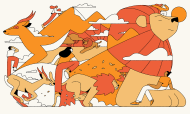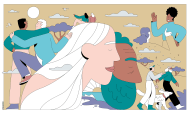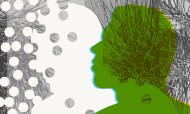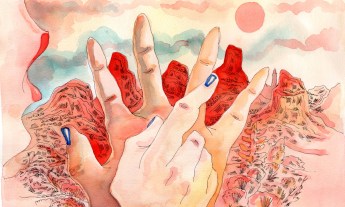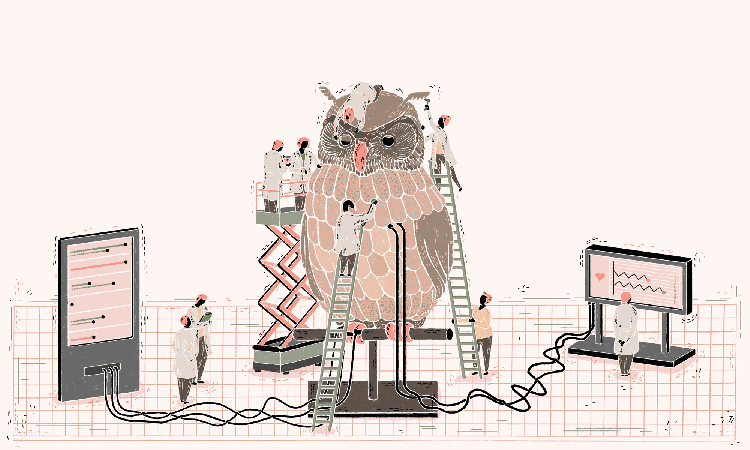
Is it possible to define, measure and even increase how wise a person is? Psychiatrist Dilip Jeste is attempting to answer those questions.
To assess our health, we weigh ourselves, measure our blood pressure, and check our cholesterol. But one scientist is trying to figure out the connection between our well-being and something much more difficult to quantify: wisdom. A team led by UC San Diego geriatric psychiatrist Dilip Jeste (TEDMED Talk: Seeking wisdom in graying matter) is seeking a scientific understanding of the trait — defining it, locating it in the brain, even measuring it. Their ultimate goal? To learn how a person can boost their wisdom, just as a patient might improve their cardiovascular health.
Humans have been thinking about wisdom for thousands of years. From the Old Testament and Aristotle to modern self-help books, we’ve tried to pin down this trait in words. In India, a major touchstone is the Bhagavad Gita, a 700-verse section of the Hindu epic The Mahabharata, in which a warrior converses with his charioteer — who is actually the god Krishna in disguise. Thought to be composed between the third and first centuries BCE, it’s a religious text that’s considered by many Indians to form the basis for a philosophy of life, with its praise of qualities such as compassion and self-control. As a child growing up in India, Jeste was steeped in the Gita. But as he entered medical school and went on to a residency in geriatric psychiatry in the US, he hardly thought of it.
Years later, the Gita returned to Jeste’s mind when he was surprised by the results of a study he did on aging and schizophrenia. As people with schizophrenia got older, they seemed to become happier and more stable. Their symptoms improved, and they were more compliant with treatment. In a subsequent study of 1,006 people without schizophrenia who were between the ages 50 and 99 in San Diego, Jeste again saw people getting happier as they aged, even as their physical health declined. What attribute could both improve with age and lead to feelings of greater overall well-being? He remembered being taught the importance of wisdom via the Gita; he’d also heard, as most of us have, that people appear to get wiser as they age. “I began wondering if that was what was meant by the wisdom of aging,” he says. But how would he start to prove such a vague hunch?
To understand wisdom as a psychiatrist, Jeste needed a new definition — not a religious or philosophical one but a scientific one. He and colleagues at UC San Diego tackled the problem from a few different angles. First, they reviewed the scientific literature, looking for commonalities among 31 articles that provided a definition of wisdom and proposed a way of measuring it. They also synthesized the opinions of 27 wisdom researchers in fields including gerontology, sociology, psychology and psychiatry. Finally, the team went back to the Gita and used text-analyzing software and statistics to sift out definitions of wisdom from that ancient work. When Jeste compared the three approaches, he found they yielded surprisingly similar results.
When it comes to wisdom, Jeste found, both modern science and ancient philosophy point to six key qualities. They are: a general knowledge of life and good judgment in social situations; control over your emotions; pro-social behaviors like empathy, compassion, altruism and a sense of fairness; insight into oneself and one’s actions (“the ability to see what mistakes you’ve made,” Jeste says); value relativism (“accepting that we don’t know what the truth is sometimes”); and decisiveness.
Jeste and his colleagues devised a wisdom scale, called SD-WISE, based on 24 statements, four statements for each of the six components of wisdom. They administered the scale online to 500 randomly selected people in San Diego, ages 21 to 100. Subjects were asked to rate how strongly they agreed with statements such as “I cannot filter my negative emotions,” which probes for emotional regulation, or “I would stop a stranger who dropped a twenty-dollar bill to return it,” which tests for pro-social behaviors. (You can see the full list of statements at the end of this piece.) For comparison, other subjects were given two other wisdom tests. Subjects were also given eight tests of emotional and mental well-being. Comparing subjects’ results on SD-WISE with the two other wisdom scales, Jeste’s team found that the scales were in good agreement.
Wisdom, as measured by this new test, seems to be associated with happiness. High SD-WISE scores correlated with higher scores on the well-being and happiness tests, which backed up Jeste’s earlier findings on aging people with and without schizophrenia. “Our hypothesis is that wisdom is good for the person and for society,” he says. But in order to prove that wisdom is actually causing people to be happier, he says, studies would need to be done that measure how increasing wisdom affects subjects’ well-being. In addition, the question remains whether Jeste’s definition of wisdom could be applied to other cultures. His study’s subjects were mostly Caucasians from the San Diego area, so “whether the findings would apply to people in Spain or in India or Australia or Nigeria, we don’t know yet,” he says.
Someday, Jeste hopes that science might be able to help us increase our own wisdom. Treatments like cognitive behavioral therapy or smartphone-based tools can teach people to notice less-than-wise impulses (such as letting your emotions get out of control), question them and choose a wiser reaction. Jeste also wants to use the scale in tandem with brain imaging to pinpoint each component’s biology.
A universal, biologically-based scale like SD-WISE may just be the first step toward what Jeste calls “a science of wisdom.” He adds, “We need to do hardcore research on wisdom the same way we do research on diseases.” Our modern society prizes intelligence, physical health and material success, values that, Jeste notes, can sometimes lead to selfishness and greed. Perhaps we’re chasing the wrong values. If “you understand yourself” — one of the subcomponents of wisdom — “you will succeed,” Jeste says. “Or at least you’ll be happy.”
Test yourself: How wise are you?
Here are the questions from the San Diego Wisdom Scale. This is not a scoreable test, but you can look at the statements, think about how they apply to you, and what you might work to improve.
Factor: Social Advising
1. I am good at perceiving how others are feeling.
2. Others look to me to help them make choices.
3. Others say I give good advice.
4. I often don’t know what to tell people when they come to me for advice.
Factor: Decisiveness
5. I have trouble making decisions.
6. I usually make decisions in a timely fashion.
7. I tend to postpone making major decisions as long as I can.
8. I would rather someone else make the decision for me if I am uncertain.
Factor: Emotional Regulation
9. I have trouble thinking clearly when I am upset.
10. I remain calm under pressure.
11. I am able to recover well from emotional stress.
12. I cannot filter my negative emotions.
Factor: Insight
13. I take time to reflect on my thoughts.
14. I avoid self-reflection.
15. It is important that I understand the reasons for my actions.
16. I don’t analyze my own behavior.
Factor: Pro-social behavior
17. I have a difficult time keeping friendships.
18. I avoid situations where I know my help will be needed.
19. I would stop a stranger who dropped a twenty-dollar bill to return it.
20. I treat others the way I would like to be treated.
Factor: Tolerance for divergent values
21. I enjoy learning things about other cultures.
22. I am okay with others having morals and values other than my own.
23. I generally learn something from every person I meet.
24. I enjoy being exposed to diverse viewpoints.
From A new scale for assessing wisdom based on common domains and a neurobiological model: The San Diego Wisdom Scale (SD-WISE). Thomas, Michael L. et al.. Journal of Psychiatric Research 2017 (1-8).
Watch Dilip Jeste’s TEDMED Talk:

